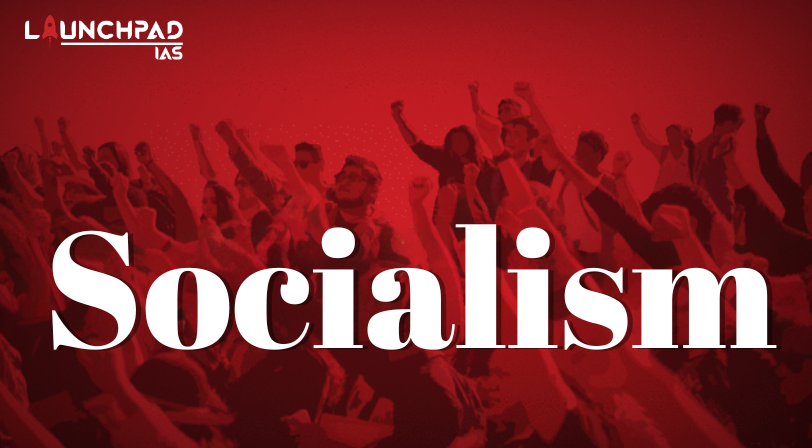- Socialism is an economic system where the means of production, such as money and other forms of capital, are owned to some degree by the public (via the state). Under a socialist system, everyone works for wealth that is in turn distributed to everyone.
- A socialist economic system operates on the premise that what is good for one is good for all and vice versa. Everyone works for their own good and for the good of everyone else. The government decides how wealth is distributed among public institutions.
- In a theoretical socialist economy, there is a more limited free market than in an archetypal capitalist economy, and thus the taxes are usually higher than in a capitalist system. There are government-run healthcare and educational systems for taxpayers. Socialist systems emphasize more equal distribution of wealth among the people.
- According to the socialist view, individuals do not live or work in isolation but live in cooperation with one another. Furthermore, everything that people produce is in some sense a social product, and everyone who contributes to the production of a good is entitled to a share in it. Society as a whole, therefore, should own or at least control property for the benefit of all its members.
-
 Complete UPSC Bookset₹7,499.00Rated 5.00 out of 5 based on 1 customer rating
Complete UPSC Bookset₹7,499.00Rated 5.00 out of 5 based on 1 customer rating -
 PSIR Optional Course₹20,000.00Rated 5.00 out of 5 based on 1 customer rating
PSIR Optional Course₹20,000.00Rated 5.00 out of 5 based on 1 customer rating -
Sale Product on sale
 UPSC CSE 2026 Online Course
UPSC CSE 2026 Online Course₹64,500.00Original price was: ₹64,500.00.₹54,500.00Current price is: ₹54,500.00.Rated 5.00 out of 5 based on 2 customer ratings
- This conviction puts socialism in opposition to capitalism, which is based on private ownership of the means of production and allows individual choices in a free market, to determine how goods and services are distributed. Socialists complain that capitalism necessarily leads to unfair and exploitative concentrations of wealth and power in the hands of the relative few who emerge victorious from free-market competition—people who then use their wealth and power to reinforce their dominance in society. Because such people are rich, they may choose where and how to live, and their choices in turn limit the options of the poor.
- As a result, terms such as individual freedom and equality of opportunity may be meaningful for capitalists but can only ring hollow for working people, who must do the capitalists’ bidding if they are to survive.
- As socialists see it, true freedom and true equality require social control of the resources that provide the basis for prosperity in any society. Karl Marx and Friedrich Engels made this point in the Manifesto of the Communist Party (1848) when they proclaimed that in a socialist society “the condition for the free development of each is the free development of all.”
This fundamental conviction nevertheless leaves room for socialists to disagree among themselves with regard to two key points.
- The first concerns the extent and the kind of property that society should own or control. Some socialists have thought that almost everything except personal items such as clothing should be public property; this is true, for example, of the society envisioned by the English humanist Sir Thomas More in his Utopia(1516). Other socialists, however, have been willing to accept or even welcome private ownership of farms, shops, and other small or medium-sized businesses.
- The second disagreement concerns the way in which society is to exercise its control of property and other resources. In this case the main camps consist of loosely defined groups of centralists and decentralists. On the centralist side are socialists who want to invest public control of property in some central authority, such as the state—or the state under the guidance of a political party, as was the case in the Soviet union. Those in the decentralist camp believe that decisions about the use of public property and resources should be made at the local, or lowest-possible, level by the people who will be most directly affected by those decisions. This conflict has persisted throughout the history of socialism as a political movement.
Pros Explained
- Reduces income inequality: In socialism, wealth is distributed among the population, and relative poverty is reduced.
- Social stability and infrastructure: With programs such as universal basic income, universal health care, and tax-funded education, individuals may be less likely to fall upon hard times.
- Greater rights for workers and individuals: Socialism protects workers from exploitation, because they own the means of production. There are often strict labor laws in place as well.
Cons Explained
- Depends on cooperation: In socialism, the idea is that everyone is working together toward the same goals. However, there is no guarantee that individuals will always want to cooperate with each other.
- Government may abuse power: The government decides how wealth should be distributed, but a corrupt government could mean that resources and wealth are not distributed fairly.
- Fewer rewards for innovation: Socialism doesn’t depend on competition, which means that workers and businesses might not be interested in continually improving their products and services.
Mixed Economies
- Most counties have a blended economic system that includes elements of both capitalism and socialism. In many socialist countries—like Sweden, for example—there are still private businesses as well.
- In the U.S There are many government-run programs that are funded through taxes, including Social Security, Medicaid, banking bailouts, and public schools.
Indian Socialism:
- Socialism in India is a political movement founded early in the 20th century, as a part of the broader movement to gain Indian Independence from colonial rule. The movement grew quickly in popularity as it espoused the causes of India’s farmers and labourers against the zamindars,princely class and landed gentry.
- Socialism shaped the principal economic and social policies of the Indian government but mostly followed Dirigism after independence until the early 1990s, when India moved towards a more market based economy. However, it remains a potent influence on Indian politics, with many national and regional political parties espousing democratic socialism.
Small socialist revolutionary groups arose in India in the aftermath of the Russian Revolution.
- The Communist Party of India was established in 1925, but socialism as an ideology gained a nationwide appeal after it was endorsed by leaders such as Jawaharlal Nehru. Socialists were amongst the first to call for outright Indian independence from colonial rule. Under Nehru, the Indian National Congress, India’s largest political party, adopted socialism as an ideology for socio-economic policies in 1936. Socialists and communists also engineered the Tebhaga movement of farmers in Bengal against the landed gentry. However, mainstream Indian socialism connected itself with Gandhism and adopted peaceful struggle instead of class struggle.
- After India’s independence in 1947, the Indian government under prime ministers Nehru and Indira Gandhi oversaw land reforms and the nationalisation of major industries and the banking sector. Independently, activists Vinoba Bhave and Jayaprakash Narayan worked for peaceful land redistribution under the Sarvodaya movement, where landlords granted land to farm workers out of their own free will.
In the 1960s, the Communist Party of India formed India’s first democratically elected communist government when it won elections in the states of Kerala and later West Bengal. However, when a global recession began in the late 1970s, economic stagnation, chronic shortages and state inefficiency left many disillusioned with state socialism. In the late 1980s and 1990s, India’s government began to systematically liberalize the Indian economy by pursuing privatization, aiming to attract foreign investment.


